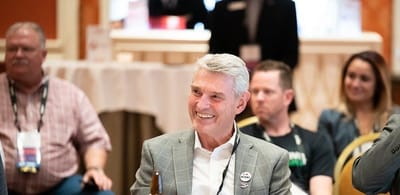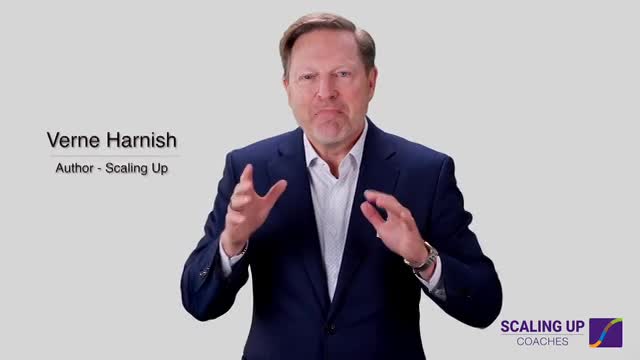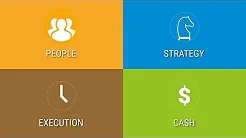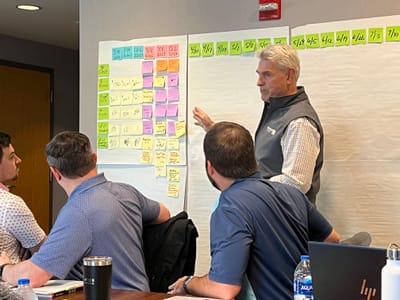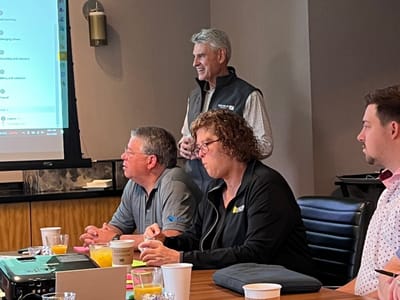In an industry as competitive and dynamic as trucking and logistics, companies are constantly seeking ways to effectively grow their businesses while ensuring a positive and engaging work environment. To achieve this, industry leaders can turn to the Scaling Up Performance platform created by Vern Harnish. This comprehensive framework emphasizes four critical decisions—People, Strategy, Execution, and Cash—that can transform trucking and logistics companies, enabling them to scale their operations, enhance profitability, and create a culture of enjoyment.
People- Key Question: Are all the stakeholders happy and engaged in the business; and would you rehire all of them?
The foundation of any successful organization lies in its people. To maximize growth and foster a positive work environment, trucking and logistics companies need to focus on attracting, developing, and retaining top talent. Insight and tools to accomplish this include:
- Talent Acquisition: Adopt rigorous hiring processes, ensuring that only the best individuals are brought on board. By identifying individuals who align with the organization's core values and exhibit the necessary skills, companies can build a strong team that drives growth.
- Leadership Development: Effective leadership is important. The company must create strategies for developing leaders within the organization, enabling them to make informed decisions, inspire their teams, and drive the company's growth agenda.
- Cultural Alignment: Establishing a vibrant and cohesive company culture is essential for long-term success. A company must better define their purpose and core values and align their entire workforce with these guiding principles. In today’s environment where there is a lack of faith in institutions overall, having a purpose and core values that are connected to the employees’ sense of purpose is emerging as a competitive advantage.
Strategy-Key Question: Can you simply state your company’s strategy- and is it driving sustainable growth in revenue and gross margins?
A well-defined and executable strategy is crucial for sustained growth. A framework for developing and implementing strategic initiatives that drive the trucking and logistics companies forward include:
- Clear Objectives: It is important that the company set clear, measurable, and ambitious goals that align with the company's vision. By clearly defining the desired outcomes, companies can steer their resources and efforts in the right direction.
- Market Differentiation: How often have I heard trucking company owners state that shippers treat them like a commodity. In a competitive industry, identifying and highlighting unique value propositions is vital, or shippers will treat your company like a commodity. A company must uncover their competitive advantages and develop strategies to differentiate themselves in the market, fostering growth and customer loyalty.
- Continuous Improvement: Encourage a culture of continuous improvement and adaptability. By regularly reviewing and refining strategies, companies can stay ahead of industry trends, leverage emerging technologies, and capitalize on new market opportunities.
Execution- Key Question: Are all processes running without drama and driving industry-leading profitability?
The ability to execute strategies effectively is often the differentiating factor between success and failure. Tools and methodologies to optimize execution include:
- Execution Planning: Develop a systematic approach to prioritize and execute critical initiatives. By breaking down larger goals into smaller, actionable steps and assigning clear responsibilities, companies can ensure progress and accountability.
- Metrics and Dashboards: It is important to track key performance indicators (KPIs) and use visual dashboards to monitor progress. This enables companies to identify areas of improvement, make data-driven decisions, and celebrate milestones, fostering a sense of achievement and enjoyment.
- Communication and Alignment: Effective communication and alignment across all levels of the organization are vital for successful execution. Tools and processes should be developed for enhancing communication channels, fostering transparency, and ensuring that everyone is aligned with the company's objectives.
Cash- Key Question: Do you have consistent sources of cash, ideally generated internally, to fuel growth of your business?
Maintaining healthy cash flow is critical for the growth and sustainability of any trucking and logistics company. Strategies to optimize cash flow management and maximize profitability include:
- Financial Planning: Companies should develop robust financial forecasts and budgeting processes. This enables better resource allocation, identifies potential risks, and ensures financial stability during growth phases.
- Profitability Analysis: Companies must analyze profitability at a granular level. By understanding the profitability of different customer segments, routes, and services, companies can make informed decisions to enhance profitability and prioritize growth opportunities.
- Capital Efficiency: With the high cost of capital, companies must focus on capital efficiency, such as optimizing asset utilization and reducing unnecessary costs. This disciplined approach to cash management strengthens the company's financial position and fuels sustainable growth.
The trucking and logistics industry presents immense opportunities for growth and success, but companies must navigate numerous challenges to capitalize on them effectively. By focusing on the four key decisions of People, Strategy, Execution, and Cash, trucking and logistics companies can build high-performance cultures, develop strategic clarity, execute plans efficiently, and maintain financial health, creating an environment where both employees and leaders find joy in the journey of Scaling Up.
To learn more about the Scaling Up Performance Platform, contact Tim Almack, Certified Scaling Up Coach.
